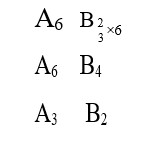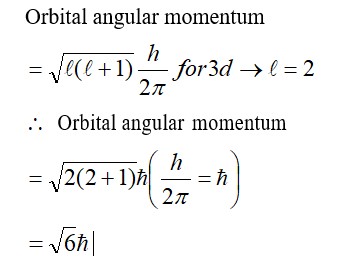During complete combustion of one mole of butane, 2658 kJ of heat is released. The thermochemical reaction for above change is
(i) 2C4H10(g) + 13O2(g) → 8CO2(g) + 10H2O(l) ∆c H = –2658.0 kJ/mol
(ii) C4H10(g) + O2 (g) → 4CO2 (g) + 5H2O (g) ∆c H = –1329.0 kJ/mol
(iii) C4H10(g) + O2 (g) → 4CO2 (g) + 5H2O (l) ∆c H = –2658.0 kJ/mol
(iv) C4H10 (g) + O2 (g) → 4CO2 (g) + 5H2O (l) ∆c H = +2658.0 kJ/mol
During complete combustion of one mole of butane, 2658 kJ of heat is released. The thermochemical reaction for above change is
(i) 2C4H10(g) + 13O2(g) → 8CO2(g) + 10H2O(l) ∆c H = –2658.0 kJ/mol
(ii) C4H10(g) + O2 (g) → 4CO2 (g) + 5H2O (g) ∆c H = –1329.0 kJ/mol
(iii) C4H10(g) + O2 (g) → 4CO2 (g) + 5H2O (l) ∆c H = –2658.0 kJ/mol
(iv) C4H10 (g) + O2 (g) → 4CO2 (g) + 5H2O (l) ∆c H = +2658.0 kJ/mol
This is a Multiple Choice Questions as classified in NCERT Exemplar
option (iii)
Standard enthalpy of combustion is defined as the enthalpy change per mole (or per unit amount) of a substance when it undergoes combustion and all the reactants and products being in their standard states at the specifie
Similar Questions for you
Kindly go through the solution
(1) [Ni (NH3)6]+2 → Ni+2 → d8, C. No. = 6,
SP3d2, Para
(2) [Co (H2O)6]+2 → Co+2 → d6, C. No. = 6
d2sp3, Dia
(3) [Ti (H2O)6]+3 → Ti+3 → d1, C. No. = 6
d2SP3, Para
(4) [Co (NH3)6]+3 → Co+3 → d5, C. No. = 6
d2sp3, Para
Taking an Exam? Selecting a College?
Get authentic answers from experts, students and alumni that you won't find anywhere else.
On Shiksha, get access to
Learn more about...

Chemistry NCERT Exemplar Solutions Class 11th Chapter Six 2025
View Exam DetailsMost viewed information
SummaryDidn't find the answer you were looking for?
Search from Shiksha's 1 lakh+ Topics
Ask Current Students, Alumni & our Experts
Have a question related to your career & education?
See what others like you are asking & answering



